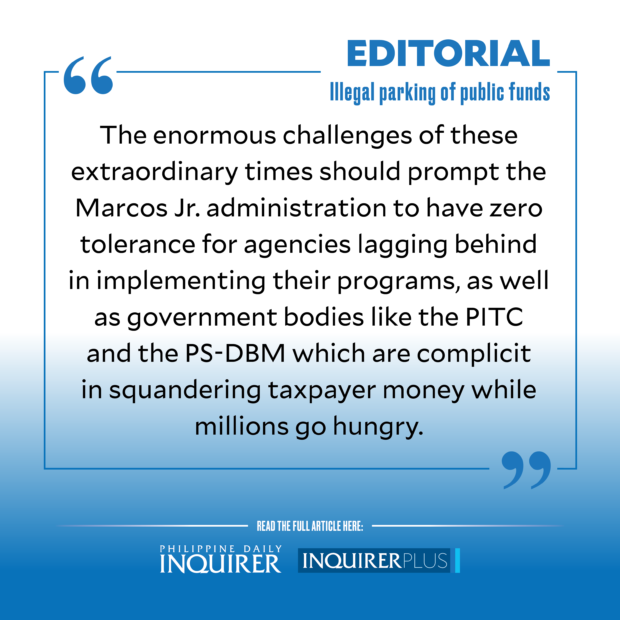Illegal parking of public funds
The shortage of supply and the high prices of such staples as rice, sugar, onions, and salt have put the Department of Agriculture (DA), which is headed by no less than President Marcos Jr., under intense scrutiny.
At a hearing of the Senate committee on agriculture last week, Sen. Cynthia Villar scored the failure of at least two DA agencies to spend scarce public funds that were meant to help farmers improve their harvests.
The committee found that the Philippine Center for Postharvest Development and Mechanization (PhilMech) was able to spend only P159 million of its P5-billion budget intended to help rice farmers develop better farming implements as provided for under the rice tariffication law. The PhilMech’s failure, said Villar, prevented domestic rice prices from being competitive with imported rice.
The committee also found that the Bureau of Soils and Water Management (BSWM) failed to distribute composting facilities for biodegradable wastes, which could have helped farmers amid high fertilizer costs. BSWM director Junel Soriano admitted that the P1.1-billion fund for this program remained unused.
“Where do you intend to put the money if you do not spend it, the PITC again? Don’t you ever think of putting your money in PITC again,” Villar warned. She was referring to the Philippine International Trading Corp., which has been used by some government agencies to “park” billions of public funds they were unable to use in time.
In 2019 and 2020, then senator Franklin Drilon exposed how billions of pesos have been parked with the PITC as far back as 2010 in violation of the law. PITC data showed that the agency received P50.7 billion from different agencies from 2014 to 2020. Since his exposés, Drilon said that the agency has remitted P10.2 billion to the government, which was used to augment its COVID-19 pandemic response in 2021.
But recent inquiries showed that the PITC and its cohort agencies are still at it, prompting senators to again call for its abolition along with the Procurement Service of the Department of Budget and Management (PS-DBM), which has emerged as the new center of corruption. PS-DBM came under fire for awarding anomalous contracts for pandemic supplies to under-funded Pharmally Corp. and more recently, for purchasing overpriced but substandard laptops for public school teachers.
Last week, the Commission on Audit (COA) noted that the PS-DBM invested P3 billion in high-yielding savings accounts with government banks, which is not part of its mandate to procure common-use supplies and equipment for other agencies.
“I think these two agencies should be abolished because it has become a bad habit to pass on funds to them,” Sen. Sherwin Gatchalian said, referring to how some government offices park funds with the PITC and the PS-DBM to avoid accountability for the low utilization of their budget.
The issue of “low utilization of funds” appears to be not just a problem of failed leadership, but of intentional malfeasance. In the past, some government agencies were known to withhold funds so these could be used as “savings” and distributed as bonuses to its officials and employees come Christmas.
But the failure or inability to spend funds allocated for specific government programs becomes a case of criminal negligence at this time when the pandemic and high inflation rate have pushed millions of Filipinos deeper into poverty.
The sorry spectacle of thousands of poor parents and students descending on the Department of Social Welfare and Services to scrounge for as little as P1,000 in aid should prompt top officials to put an end to this racket of parking and hiding unspent public funds with the PITC and the PS-DBM.
Aside from the DA, the COA also flagged the Department of the Interior and Local Government in July for failing to spend P577 million of its P4.038-billion budget for COVID-19 response in 2021, the height of pandemic cases and lockdowns. In March, COA said P4.99 billion or more than half of the funds for loans to help micro, small, and medium enterprises cope with business losses because of the health crisis remained unused as of mid-2021.
Now, the government is besieged by the lack of funds to prop up an economy battered by the pandemic and the massive foreign debt racked up by the Duterte administration.
In a speech at the 100th-anniversary celebration of the Philippine Nurses Association, Mr. Marcos acknowledged that the P25.82 billion allocated for benefits among health care workers, the heroes of the pandemic era, was not enough but that the government was hard pressed to find additional funds. “(M)edyo hirap tayo sa pondo ngayon, kaya’t sa ganyan lang muna, (We’re short on funds, so that will have to do for now),” he said.
The enormous challenges of these extraordinary times should prompt the Marcos Jr. administration to have zero tolerance for agencies lagging behind in implementing their programs, as well as government bodies like the PITC and the PS-DBM which are complicit in squandering taxpayer money while millions go hungry.





















